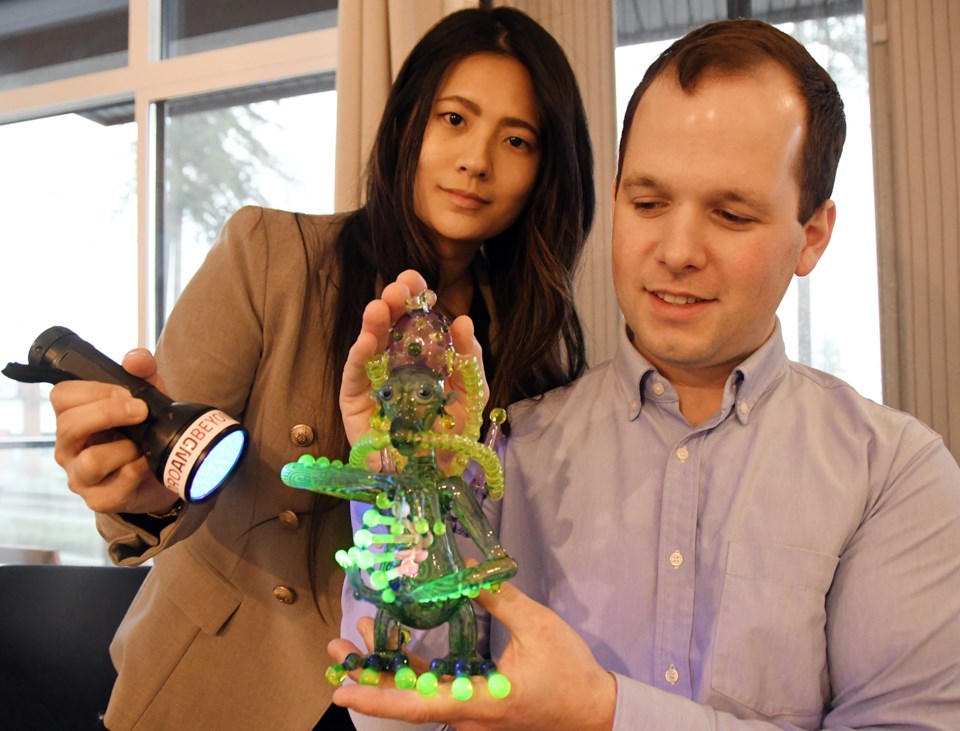A Coquitlam couple is calling on the provincial government to allow cannabis consumption spaces in B.C.
Jeff and Vicky Curtis say they’ve facilitated more than a dozen social lounges at private events in Vancouver, Kelowna, on Vancouver Island and in Alberta where visitors 19 years and older can inhale, drink or chew cannabis products.
And in July, during the RibFest weekend, they’ll host a cannabis/dab event to educate the Port Moody crowd.
“We’ve organized many events, so we kind of have this down pat,” Jeff Curtis, a Pinetree Secondary graduate, told the Tri-City News last month.
“We have a lot of support for what we’re doing because it makes sense.”
As part of their businesses, TruQuartz and Boro and Beyond, the Curtises have lobbied for action to spur cannabis tourism in B.C.: They’ve spoken before Coquitlam city council, pressed the Tri-Cities mayors at a Tri-Cities Chamber of Commerce gathering and presented their advocacy work at the Chamber’s Business Expo.
But, for the most part, civic politicians close their ears when they start talking cannabis lounges, they said.
Still, the couple is getting a lift from the Chamber itself, as well as the Retail Cannabis Council of BC (RCCBC).
In a letter last April, Chamber CEO Leslie Courchesne wrote that cannabis lounges “would not only provide new business opportunities for our community but also help to promote responsible and safe cannabis use.”
Jaclynn Pehota, executive director of RCCBC, also noted in her letter to the Tri-City councils that there’s a public demand for cannabis space since the federal government declared recreation cannabis legal in 2018.
“Our members believe that as cannabis is legally integrated into our society, cannabis consumption spaces are no different than in their function from bars and pubs, which provide safe, regulated spaces for adults to consume alcohol,” she wrote in her letter to councils.
“Cannabis lounges and cafés represent the same social benefits such as reducing nuisance, noise, impaired driving and providing public education opportunities.”
Pehota cited a 2022 survey by the Ministry of Public Safety and Solicitor General — headed up by Port Coquitlam MLA Mike Farnworth — revealing 61 per cent of telephone respondents backed cannabis lounges.
The ministry told the Tri-City News it’s reviewing “the laws and restrictions that currently limit cannabis consumption in public spaces and considering changes that would allow for consumption in other types of spaces."
"As this work continues, it’s important to note that cannabis consumption in cannabis retail stores is not authorized and smoking and vaping cannabis is subject to local and Indigenous government rules and bylaws.”
While B.C. and Ontario are organizing their regulatory frameworks, Alberta does allow temporary designated cannabis consumption lounges at festivals and events; there are calls to expand the legislation to cities.
In the U.S., there are now 10 states that allow some social consumption of recreation cannabis:
- Alaska
- California
- Colorado
- Illinois
- Massachusetts
- Michigan
- New Jersey
- New Mexico
- New York
- Nevada
Jeff Curtis said Germany, which is poised to legalize adult-use cannabis this year, is studying Canada’s roll out and lack of cannabis consumption spaces.
“The first thing they’re addressing is where people can consume,” he said.
“For our private events, of which the host has to provide the products, we have professionals or dab-tenders who are educated in cannabis dosage,” he added. “It’s like they’re giving you an aromatherapy experience.”
“At the end of the day, we just want to normalize this because there’s still such a strong stigma out there.”





